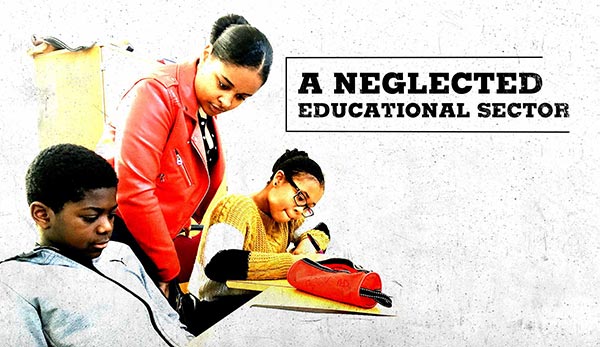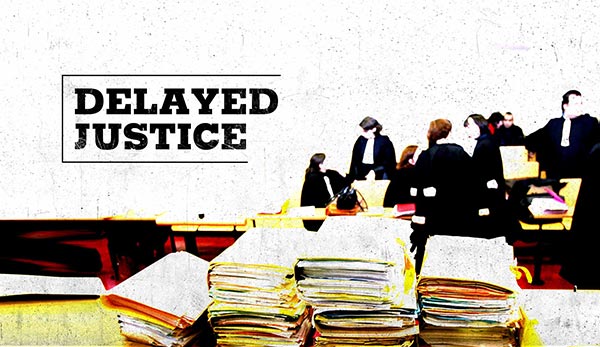At the High Court in Bobigny, last winter was a tough one. For a whole month, a full wing of the building had no heat. Several hearings had to be cancelled. “It wasn’t even 10°C in the offices,” recalls Judge Sophie Combes, who is also a magistrates’ union representative. During that time, the court was strewn with boxes overflowing with case files.
Money has since been found in the budget for renovations, infrastructure improvements and archive management. The cardboard boxes have disappeared. But for the people who work here every day, those improvements aren’t sustainable. Bobigny’s High Court – the second busiest in France after Paris – is getting too small and the computer equipment wasn’t designed for the modernisation of the justice system that Emmanuel Macron’s government wants to see.
Custodial judge Sarah Massoud came to Bobigny in February 2018. While she says she loves the working atmosphere, she acknowledges that the inadequate computer resources hamper her work. “They talk 21st century digitisation and all that, and we have computers that are not powerful enough, inboxes that max out if we’re off for a week on holiday, software for accessing the digital case files that regularly malfunctions… At the same time, the government’s objectives say we absolutely must ensure that digitisation prevails.”
A few metro stations apart, unequal processing delays
Still, it is the lack of human resources that handicap the court the most. Judge Combes had to cancel some of her hearings when a member of her team took her maternity leave. “With one colleague, we’re handling a minimum of the [absent person’s] section because two people can’t do three jobs, but it is unsatisfactory. We had decent waiting times in our chamber but, under the circumstances, we’ve had to extend them,” she laments.
And this is taking into account the fact that the High Court has already been allocated additional means. But it’s a fragile equilibrium. After Bobigny’s public prosecutor pulled no punches in criticising the court’s dysfunction, eight new judges were assigned to the jurisdiction. “The situation remains worrisome and will stay that way as long as the jurisdiction is not bolstered to match its needs,” says Public Prosecutor Fabienne Klein Donati.
“In 2015-16, there were barely 100 judges at the court when there should have been, at a bare minimum, 120. Today, there are 137 of us thanks to the reinforcements,” Combes explains.
Those reinforcements have helped judges bring down their case processing times, in particular the family court judges. “Back then, it took a year for a decision to come down, when in Paris it was taking two or three months. Only a few metro stations apart, there was a major breach of equality. Today, we’re down to a three- or four-month wait.”
The justice system’s image has deteriorated due to the long waiting periods, according to a parliamentary report drawn up by François Cornut-Gentille and Rodrigue Kokouendo. “These [long] waits create a sentiment of impunity with regard to delinquents which, according to the mayor of Clichy-sous-Bois [questioned by National Assembly lawmakers], reigns among the public when it sees offenders summoned so long after the infractions committed.” Indeed, in October 2017, Paris’s High Court condemned the French State, finding it had been derelict in its duty to the “jurisdictional protection of individuals”.
Cases dismissed, police searches postponed, detentions cut short
In Seine-Saint-Denis, the police, too, suffer from glaring staff shortages, including a shortage of detectives. Judicial police officers, the law enforcement personnel who conduct criminal investigations, only represent 9.4 percent of public safety staff in Seine-Saint-Denis, compared to 16.9 percent in Paris and 15.2 percent in the neighbouring Val-de-Marne administrative department, according to the parliamentary report on State action. But their work is essential to the smooth running of judicial inquiries because they are the ones who carry out the raids and take suspects into custody.
“Often the public prosecutor’s office gives judicial police officers six months to carry out their inquiries. Our colleagues don’t always manage to do so within the allotted time,” says Gregory Goupil, a police officer and member of the Alliance 93 police union. As a result, inquiries can be dismissed, police searches postponed and suspects set free because they haven’t been interrogated within a certain time frame by a judicial police officer, the only officers authorised to issue advice to the public prosecutor’s office on whether to extend a suspect’s detention. “Our colleagues find themselves prioritising case files. They would like to be able to manage all of the cases in the same way, but they end up putting certain ones off,” says Goupil. In Seine-Saint-Denis, the victim of a break-in, for example, will have to wait longer to see an inquiry concluded. “An investigation into a death will jump ahead of a break-in,” Goupil explains, “because the judicial police officer must proceed quickly in that sort of case to take photos of the body.”
Weekends are even worse. Police stations are obliged to pool their resources to share the officers who investigate crimes. In practice, that restricts how many people can be taken into custody. “In a district with seven cities, if we go over 35 detentions per weekend, we have approached our saturation point,” Goupil estimates.
The shortage of investigators also hampers police work on the ground in drug trafficking cases. “We are the administrative department most affected by delinquency and insecurity over narcotics trafficking. And yet everyone knows that arresting the small-time dealer on a low-income housing estate isn’t going to put an end to that sort of traffic. It’s by tracing back up the chain and investigating,” says Saint-Denis mayor Laurent Russier. The mayor laments the fact that, in his city as well as department-wide in the rest of Seine-Saint-Denis, the police force, all units combined, are undersized. “In Saint-Denis, we have one police officer per slightly more than 400 residents when, in Paris’s 18th arrondissement, the figure is one per 300. And yet that’s just across the Paris ring road. The situations are a bit similar, with perhaps even higher levels of delinquency here, so in practice we should have more police officers to show for it. But it’s the opposite,” the mayor says. Russier’s city is one of those eyeing a lawsuit against the state for “breach of equality”.
“We’re not asking for special treatment. We’re not asking for more police officers than the average. We are just asking to be treated equally,” adds the mayor, elected under the French Communist Party banner. Russier’s appeal does appear to have been heard because French Interior Minister Christophe Castaner announced in late-February that 20 “battle-hardened’ police officers would be assigned to bolster Saint-Denis’s station within a very specific framework, that of “reclaiming neighbourhoods for the Republic”. But of the 30-odd municipalities included in that reconquering scheme, which dates back to last year, only four are in Seine-Saint-Denis, regrets Russier.
‘The fewer services police provide, the less the population appreciates them’
In Stains, another of the municipalities considering the lawsuit, there is one police officer for every 580 residents, its mayor says. Azzedine Taïbi notices the toll the police shortage has taken on his constituents. The feeling of insecurity is rising and trust in the police force continues to erode. “Residents complain that whenever they call the police, they are told no one can come because they only have one patrol car,” the mayor reports. In Aulnay-sous-Bois, a few years ago, City Hall ended up dedicating one of its municipal police cars to be used by the national police, recalls Noam Anouar, a delegate for the Vigi police union who worked in Seine-Saint-Denis for 10 years.
“The fewer services police provide, the less the population appreciates them,” says Christian Mouhanna, a National Centre for Scientific Research expert and the director of the Centre for sociological research on the law and penal institutions. “We know that going out on a call in Seine-Saint-Denis requires at least two vehicles. But the police are short on cars. Instead of responding in 10 minutes, it will take 45 minutes. And if the police officers arrive too late, they lose their credibility with the residents,” says Mouhanna.
“In Saint-Denis, 10 years ago, we didn’t have municipal police officers. Because the State wasn’t putting resources into the national police, that force stopped performing certain duties for which they’d been responsible,” Russier recounts. “So we set up municipal services for mediation and prevention to allow the national police to focus on the core of their mission, which is the security of property and people.” In France, the national police force falls under the authority of the interior ministry while municipal police forces are funded by city governments. The latter can only respond to calls within their city’s territory and they are not authorised to carry out investigations.
“City police forces compensate for the lack of personnel,” recognises Goupil.
Anouar shares that assessment and hails “the mayors able to show their pragmatic side”. However, the proliferation of municipal police forces creates its own issues. Depending on whether you live in Bobigny or next door in Drancy, you won’t enjoy the same level of security.
Already vulnerable citizens
Taïbi, the mayor of Stains, believes the decreased availability of public services in low-income neighbourhoods weighs on citizens, who are already socially vulnerable.
Combes, who presides over disputes over joint property matters and commercial leases and rents at Bobigny’s High Court, cites an example. “When people no longer pay their rent and must be evicted, but cannot be re-housed right away, they can ask the High Court for a delay before leaving the premises,” the judge explains. In the absence of a High Court judge, the decision – to grant the delay or not – is sometimes delivered after the person has already been evicted. Referral to an enforcement judge doesn’t delay an eviction per se. “People who have asked for a delay so they won’t be evicted are then evicted [anyway] because the court has taken so long to reply,” Combes says.
‘Fictional judges’
Among these vulnerable populations, children are again the most at risk. In Seine-Saint-Denis, where more than 43 percent of the population is under the age of 32 (compared to 36.2 percent in mainland France), juvenile justice suffers most from the shortfall in resources. On November 5, the judges that preside over Bobigny’s juvenile court penned an op-ed published in Le Monde entitled, “Our warning is a call for help,” to express their concern. The magistrates lamented unacceptable delays in caring for children in danger. “Up to 18 months can pass between the hearing during which the decision is delivered and the follow-up by a caseworker,” they wrote.
According to the juvenile court judges, things are very different in Paris. “On the other side of the ring road, court-mandated educational measures are handled without delay, which creates an inadmissible inequality in the response to families’ problems.” Deficient resources for juvenile justice are such that these magistrates consider they have become “fictional judges”.
The shortfall of resources in Seine-Saint-Denis means that enforcing penalties, educational measures and treatment obligations cannot be guaranteed, which can endanger minors. “Shelters, caseworkers in sufficient numbers… it all depends on the department, but [in Seine-Saint-Denis] you are dealing with a poor department,” Mouhanna says. “The consequences can be serious for the minors who will remain victims or get stuck in a spiral of delinquency.”
As a custodial judge, Sarah Massoud is charged with remanding indicted suspects to custody or getting them out of pre-trial detention. In her opinion, “The issue of care facilities for people who have been placed under formal investigation is vital,” especially as far as their mental health is concerned.
Massoud says inmates often need psychiatric care more than they need time in prison, but public facilities like addiction- and medical-psychological centres in Seine-Saint-Denis are routinely full.
Under the circumstances, “One can impose mandated treatment like there’s no tomorrow, but if someone has to wait six months for an appointment or if facilities are unsuitable for someone who has been living on the street, judicial supervision serves no purpose,” Massoud laments.


